DIAGNOSTIC TESTS
Endocrinology Consultation
Evaluation of the glands that make hormones to regulate many of the body’s functions.
The endocrine system is made up of ten glands that produce hormones to regulate many of the body’s functions, such as metabolism, growth, and reproduction. In order to assess function, laboratory methods, such as blood tests, are needed to monitor, diagnose and treat diseases of the endocrine glands, as well as disorders of the hormone glands, metabolism, and reproductive health issues. Endocrinologists specialize in diagnosing and treating many conditions, such as diabetes, thyroid disorders, hormonal imbalances, and metabolic conditions. Consultations with an endocrinologist not only play an important role in the diagnosis and treatment of these conditions, but they are also crucial in educating the patient on lifestyle changes required to prevent the condition from worsening or to hasten the treatment process.
The results of a endocrinology consultation vary from person to person. Some people may find out that they require immediate treatment, while others may have a well functioning endocrine system and only need to continue living a healthy lifestyle.
BEFORE THE TEST
The procedures of a endocrinology consultation may vary, but will typically include an interview, physical examination, other examinations as required, and a diagnosis of the patient’s condition. However, preparation for the consultation is also an important step. To maximize the benefits that this procedure can offer, patients are encouraged to:
- Prepare a list of any medications being taken
- Bring results of other medical exams and tests
- Prepare a list of questions to ask the endocrinologist
- Create a complete list of symptoms including their severity and when they started to show
DURING THE TEST
During the first consultation, the endocrinologist will take a detailed medical history and do a physical examination. You will be able to explain and discuss the details of your symptoms.
AFTER THE TEST
Once the endocrinologist has collected all the necessary information, the patient will be informed of the diagnosis and treatment options, which can include:
- Lifestyle changes, which may include those to your diet and physically activity.
- Certain tests, such as blood tests
- Medications
- Scheduled follow-up visits
Source: Canada.ca
Locations
Google Reviews
I always have a positive experience when I visit my endocrinologist. I look forward to our visits and am always taken care of.
– RODRIGO G.

